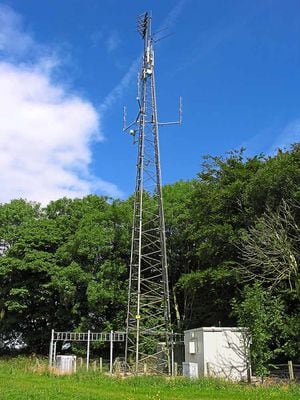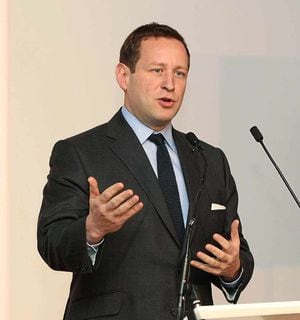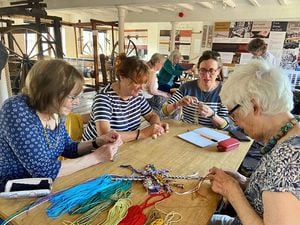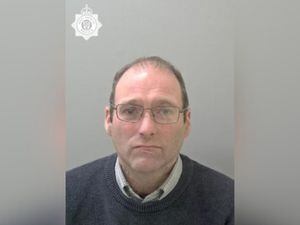Special report: Changes ring for Shropshire phone coverage?
Ronan Dunne, chief executive of phone operator O2, makes a wry observation on the thorny issue of mobile phone coverage in rural areas.

"Five years ago I gave evidence at the Commons Select Committee and at that time the vast majority of MPs who wrote to me about mobile coverage were asking us not to put a mast up because somebody in their community did not want it," he said.
"Now almost 100 per cent of the MPs who write to me are contacting on behalf of constituents who want better coverage in their area."

The conflict between the demand for a better mobile phone signal and finding appropriate places to install new masts is one that will be familiar to thousands of people across Shropshire and Mid Wales.
Last year, 2,000 people signed the Shropshire Star's Get Us Connected petition, which called for the big four mobile phone providers – O2, EE, Vodafone and Three – to improve their service in rural areas, and North Shropshire MP Owen Paterson is due to meet with representatives of the companies this month.
But just a few weeks ago, when the Shropshire Star went on the road to put the region's mobile phone coverage to the test, we found that there were still great swathes of Shropshire and Mid Wales where phone coverage was at best patchy, and in some instance non-existent.
Ludlow, Craven Arms, Welshpool and Clive were identified as being particularly problematic, with parts of Newport and even Shrewsbury also suffering from problems.

Guy Middleton, of EE, says his firm is committed to meeting the Government's requirement of 90 per cent geographical coverage by 2017.
"For our part we are adding additional coverage through a combination of new sites and new radio spectrum that help us cover more people in more places and offer a better service," he says.
"The national 90 per cent geographic coverage obligation is for voice, but EE customers will get 4G data too."
But he says while there was a desire among the big four to improve signals in rural areas, the Government also has a role to play in addressing outdated regulations on site access, planning and costs.
He says guidelines, which date back to the 1980s, can leave phone operators at the mercy of landowners who charge excessive rents for mast locations and hinder access for repairs.
Mr Middleton says while the terms of government licensing agreements impose standards on them akin to those for public utilities, present legislation offered none of the special protection which utility companies benefited from. He says some landowners are well aware of this, and exploit the situation for commercial gain.
"There was a case where we had been paying £2,000 for 12 years, not for the mast itself, but to use the road to access the mast," says Mr Middleton. "Suddenly, that was increased to £200,000 in perpetuity. No sensible business can sustain that sort of increase."
Getting permission from site owners to repair faulty masts can also be a minefield, he says. "When there is a fault with a mast, we would normally want to deal with that within six hours, but very often the site owner won't let us gain access that quickly, or they are not around.
"We would like to see the Government give us more protection in terms of rent and being able to get access to our site."
The issue was raised in Parliament before Christmas in a debate attended by minister for the digital economy Ed Vaizey.

Mr Vaizey says opposition from local authorities, pressure groups and major organisations is often an obstacle to improving phone companies.
"I have been slightly astonished that organisations such as the National Trust have point blank refused to have masts on their land and planning authorities have turned down applications for masts despite local communities wanting them," he told the Commons debate.
"Some members of local communities have even put concrete blocks in front of the generators provided for mobile masts.
"We have had some astonishing examples, where one part of the local community has actively tried to stop a mobile mast when the rest of the community wants it.
"We can work together with landowners to provide them with better coverage as long as they are prepared to support mobile masts and not see them as a cash cow or simply oppose them."
Richard Yates, who runs Manor Farm at Middleton Scriven, near Bridgnorth, is sceptical about this.
"I know plenty of landowners around here who would welcome a new mast," he says. "At the moment there is a mast here and it is useless. I would be all for them knocking it down and building a bigger one."

Mr Yates, Shropshire NFU chairman, says the poor reception on his O2 phone is a constant problem.
"The signal here is terrible and apparently it has got worse over the past two years," says Mr Yates.
"I am trying to run a business, but sometimes I have to stand on one leg to get a signal." Indeed, as we speak, his phone cuts out.
Mr Middleton says the solution lies in an overhaul of the Electronics Communications Code, a set of government guidelines laying out policies for the construction of telecommunications infrastructure, which has been largely unchanged since 1984.
"Right now the resilience of and upgrading of all public wireless networks is dependent on prompt access, something that the code in its present form does not require, leading to disputes, delays and sometimes sustained outage," he says.
"Reform of the ECC could lead to more innovation, better quality networks and greater resilience at a lower cost base.
"We're hopeful that government will meet the commitments made in December 2014 to address the barriers through reform of the Electronic Communication Code to make it simpler to build, fix and upgrade coverage."
Mr Vaizey points out that a recent report by the International Telecommunication Union saw the UK rise from 10th place in 2010 to fourth place in 2015 in terms of internet connectivity, much of which was driven by mobile coverage.
He says modern smartphones, which have short, built-in aerials, are less efficient at making and receiving calls compared to older mobiles.
Mr Vaizey adds that UK mobile phone contracts are also much cheaper compared to other countries.
O2's Mr Dunne hopes last month's Parliamentary debate, and the positive noises from Mr Vaizey, heralds a new approach from Government.
"There is no Government subsidy for mobile broadband of any kind and, challengingly, the single biggest difficulty we have in rolling out coverage is that, unlike fixed operators, we have no rights of access, we have no special provisions in legislation to allow us to get access to sites, or to allow us to get special arrangements on planning or other things," he says.





